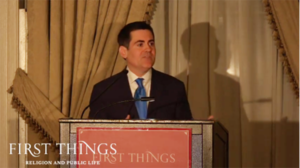If the Religious Right is to survive, it must embrace a “gospel-centered” evangelicalism that articulates why and how Christianity matters rather than using religion as a means toward a political end, the Southern Baptist Convention’s top spokesman for public policy concerns said in a prestigious lecture Oct. 24.
”A Religious Right that is not able to tie public action and cultural concern to a theology of gospel and mission will die, and will deserve to die,” Russell Moore, president of the SBC Ethics and Religious Liberty, said in the 29th Erasmus Lecture sponsored by First Things magazine.
 “One of the wrong assumptions of some in the old Religious Right establishment is that the church as formed theologically simply needs to be mobilized politically,” Moore said in an hour-long address titled Can the Religious Right be Saved?
“One of the wrong assumptions of some in the old Religious Right establishment is that the church as formed theologically simply needs to be mobilized politically,” Moore said in an hour-long address titled Can the Religious Right be Saved?
“That assumption is wrong,” Moore said, evidenced by the slowness of evangelical Protestants to embrace the pro-life movement following the 1973 landmark Supreme Court decision in Roe v. Wade.
“Bill Clinton learned his view that personhood begins with breath, not with conception — used to justify his veto of legislation on partial-birth abortion — he learned that not from Planned Parenthood but from a conservative Southern Baptist pastor’s teaching from Genesis,” Moore said.
“Even now, some abortion providers tell us that the majority of their clients are not pro-choice,” he continued. “They are instead Roman Catholics or evangelical Protestants who believe that they are committing a grave sin but committed to looking for mercy afterward. That’s not just a social problem. That is a theological problem.”
Moore said the various streams of the Religious Right can work together despite theological differences
“I don’t accept the Christology or the doctrine of salvation of the Church of Jesus Christ of Latter-day Saints,” he said. “They don’t believe that I am a member of an authentic church. But we can happily co-labor together, because there’s no confusion about our deepest convictions and where the point of connection is.”
“But when, for instance, prosperity gospel hucksters are received as fellow Christian leaders by evangelical Protestants, we have declared war on the gospel itself,” Moore said. “Health and wealth prosperity theology, in its hard or soft forms, is not just another stream of historic Christianity. It is the old Canaanite fertility religion except worse, because it takes the name of our Lord in vain under the pretense of apostolic Christianity.”
Moore said one problem with the Religious Right establishment is it is too “liberal,” meaning that it seems willing to sacrifice theology to achieve earthly ends.
“When a religion is seen as a political agenda in search of a gospel useful enough to accommodate it, one will end up pleasing those who see the primacy of politics while losing those who believe the gospel,” he said.
Moore said nostalgia and appeals “that we are losing our country” only work if success is defined as a nominal cultural Christianity “that can be quite good for restraining some aspects of overt immorality, but is worse than paganism if there is in fact a hell.”
“Likewise, the sort of apocalyptic language that presents every presidential election as an Armageddon, from whence one cannot recover, is the sort of theological liberalism that makes no sense in a religion in which Augustine wrote the City of God in the context of a collapsing Rome,” Moore said.
“Even at the level of pragmatic politics, such appeals leave a constituency cynical and burned over. The younger generation of evangelicals sadly, and to the church’s detriment, they hardly ever speak much about biblical prophecy,” Moore continued. “Why? Because they are exhausted by the hyperventilating of some evangelicals in the last generation over blood moons and red heifers.”
“That is much more the case with endless appeals to act now or lose everything that prove not to be true in a world that is fallen and depraved but also made resilient by the sustaining power of common grace and the grain of theology of creation itself.”
Moore said the Religious Right can be saved, but “not with just tinkering around the edges.”
“Religious conservatives will need a robust religion and a sense of what is in fact to be conserved,” he said. “This will mean abandoning the idea of a moral majority or a silent majority within the nation and building instead collaborative majorities, often issue by issue. It will mean institutions which have the vision and the financial resources to play a long game of cultural renewal and persuasion, not driven merely by the populist passions of the moment.”
